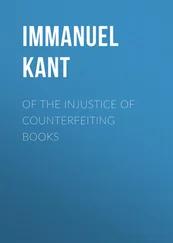8 ”He considered nothing done, so long as anything remained to be done.”
9 In order to cognize an object, I must be able to prove its possibility, either from its reality as attested by experience, or a priori , by means of reason. But I can think what I please, provided only I do not contradict myself; that is, provided my conception is a possible thought, though I may be unable to answer for the existence of a corresponding object in the sum of possibilities. But something more is required before I can attribute to such a conception objective validity, that is real possibility — the other possibility being merely logical. We are not, however, confined to theoretical sources of cognition for the means of satisfying this additional requirement, but may derive them from practical sources.
10 The only addition, properly so called — and that only in the method of proof — which I have made in the present edition, consists of a new refutation of psychological idealism, and a strict demonstration — the only one possible, as I believe — of the objective reality of external intuition. However harmless idealism may be considered — although in reality it is not so — in regard to the essential ends of metaphysics, it must still remain a scandal to philosophy and to the general human reason to be obliged to assume, as an article of mere belief, the existence of things external to ourselves (from which, yet, we derive the whole material of cognition for the internal sense), and not to be able to oppose a satisfactory proof to any one who may call it in question. As there is some obscurity of expression in the demonstration as it stands in the text, I propose to alter the passage in question as follows: “But this permanent cannot be an intuition in me. For all the determining grounds of my existence which can be found in me are representations and, as such, do themselves require a permanent distinct from them, which may determine my existence in relation to their changes, that is, my existence in time, wherein they change.” It may, probably, be urged in opposition to this proof that, after all, I am only conscious immediately of that which is in me, that is, of my representation of external things, and that, consequently, it must always remain uncertain whether anything corresponding to this representation does or does not exist externally to me. But I am conscious, through internal experience, of my existence in time (consequently, also, of the determinability of the former in the latter), and that is more than the simple consciousness of my representation. It is, in fact, the same as the empirical consciousness of my existence, which can only be determined in relation to something, which, while connected with my existence, is external to me. This consciousness of my existence in time is, therefore, identical with the consciousness of a relation to something external to me, and it is, therefore, experience, not fiction, sense, not imagination, which inseparably connects the external with my internal sense. For the external sense is, in itself, the relation of intuition to something real, external to me; and the reality of this something, as opposed to the mere imagination of it, rests solely on its inseparable connection with internal experience as the condition of its possibility. If with the intellectual consciousness of my existence, in the representation: I am, which accompanies all my judgements, and all the operations of my understanding, I could, at the same time, connect a determination of my existence by intellectual intuition, then the consciousness of a relation to something external to me would not be necessary. But the internal intuition in which alone my existence can be determined, though preceded by that purely intellectual consciousness, is itself sensible and attached to the condition of time. Hence this determination of my existence, and consequently my internal experience itself, must depend on something permanent which is not in me, which can be, therefore, only in something external to me, to which I must look upon myself as being related. Thus the reality of the external sense is necessarily connected with that of the internal, in order to the possibility of experience in general; that is, I am just as certainly conscious that there are things external to me related to my sense as I am that I myself exist as determined in time. But in order to ascertain to what given intuitions objects, external me, really correspond, in other words, what intuitions belong to the external sense and not to imagination, I must have recourse, in every particular case, to those rules according to which experience in general (even internal experience) is distinguished from imagination, and which are always based on the proposition that there really is an external experience. We may add the remark that the representation of something permanent in existence, is not the same thing as the permanent representation; for a representation may be very variable and changing — as all our representations, even that of matter, are — and yet refer to something permanent, which must, therefore, be distinct from all my representations and external to me, the existence of which is necessarily included in the determination of my own existence, and with it constitutes one experience — an experience which would not even be possible internally, if it were not also at the same time, in part, external. To the question How? we are no more able to reply, than we are, in general, to think the stationary in time, the coexistence of which with the variable, produces the conception of change.
Introduction.
I. Of the difference between Pure and Empirical Knowledge
Table of Contents
That all our knowledge begins with experience there can be no doubt. For how is it possible that the faculty of cognition should be awakened into exercise otherwise than by means of objects which affect our senses, and partly of themselves produce representations, partly rouse our powers of understanding into activity, to compare, to connect, or to separate these, and so to convert the raw material of our sensuous impressions into a knowledge of objects, which is called experience? In respect of time, therefore, no knowledge of ours is antecedent to experience, but begins with it.
But, though all our knowledge begins with experience, it by no means follows that all arises out of experience. For, on the contrary, it is quite possible that our empirical knowledge is a compound of that which we receive through impressions, and that which the faculty of cognition supplies from itself (sensuous impressions giving merely the occasion), an addition which we cannot distinguish from the original element given by sense, till long practice has made us attentive to, and skilful in separating it. It is, therefore, a question which requires close investigation, and not to be answered at first sight, whether there exists a knowledge altogether independent of experience, and even of all sensuous impressions. Knowledge of this kind is called a priori , in contradistinction to empirical knowledge, which has its sources a posteriori , that is, in experience.
But the expression, “ a priori ,” is not as yet definite enough adequately to indicate the whole meaning of the question above stated. For, in speaking of knowledge which has its sources in experience, we are wont to say, that this or that may be known a priori , because we do not derive this knowledge immediately from experience, but from a general rule, which, however, we have itself borrowed from experience. Thus, if a man undermined his house, we say, “he might know a priori that it would have fallen;” that is, he needed not to have waited for the experience that it did actually fall. But still, a priori , he could not know even this much. For, that bodies are heavy, and, consequently, that they fall when their supports are taken away, must have been known to him previously, by means of experience.
Читать дальше












